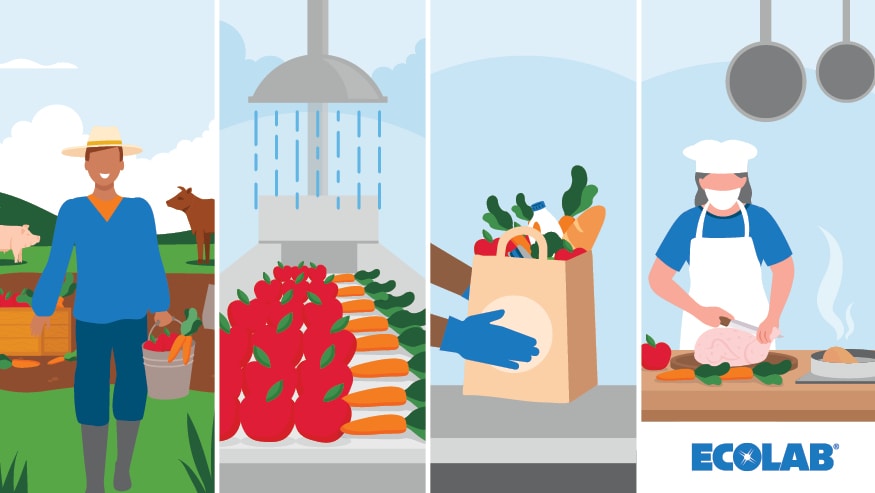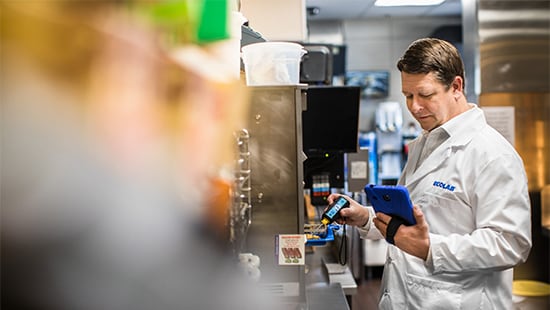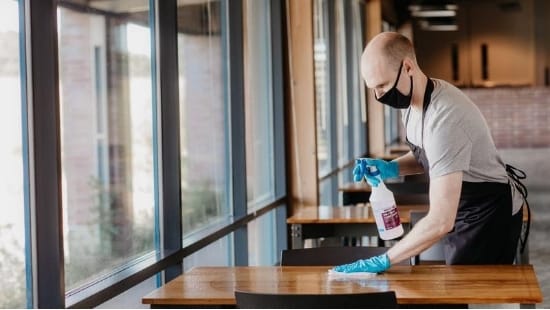Keeping Our Guard Up Against Foodborne Illness
How to maintain the food safety gains made in the last year

World Food Safety Day serves as a reminder of the importance of proper hygiene protocols, solutions and training to ensure safe food from farm to fork.
It can seem challenging to find positive takeaways from the COVID-19 pandemic, but there’s one silver lining for the food industry that’s worth noting: a dramatic drop in foodborne illness.
In the last year, studies have shown our global measures to protect against coronavirus — wearing face coverings, physical distancing, enhancing hygiene and disinfection practices — may have also contributed to a decline in foodborne diseases. One study conducted in the U.S. last year found an 86% reduction in norovirus infections, a leading cause of foodborne illness.
That’s a remarkable decline and a strong reminder that foodborne illnesses are preventable and good hygiene habits are part of the equation. In recognition of World Food Safety Day on June 7, we tapped Ecolab experts to weigh in on how we can avoid complacency and continue to minimize food safety risks while also addressing key challenges businesses face as they return to full operations.

Amanda Bakken
Lead Chemist, Research, Development & Engineering, InstitutionalThe pandemic created a cultural shift around cleanliness, hygiene and food safety. The best way to make sure it sticks is to set clear expectations for ongoing visible cleaning internally with staff, as well as with customers. When customers see how seriously a business is taking precautions, they’ll feel safe and comfortable.
It’s also important that we change the narrative around cleaning protocols and show that they weren’t just about COVID-19, but that we’re continuing them to prevent foodborne illness and other diseases. We saw positive effects from the heightened level of cleanliness, and we want to continue those and see them in the future.
The biggest challenge in the food service industry right now is labor. Due to pandemic-related restrictions and closures, returning to full staffing and service levels can be challenging. With an influx of new employees, effective training will be critical to maintain food safety and the level of service that customers expect and businesses want to provide. Utilizing Ecolab and our training tools, protocols and procedures will help support in-person efforts and enable effective cross-training of staff.

Dr. Elaine Black
Director, Food Safety and Public HealthWe have to acknowledge that the drop in foodborne illness was largely because we all became better and more aware of our own hygiene practices. We were washing our hands and enhancing cleaning and public health protocols. It was a mindset where we understood why we were making these efforts and we became used to making them.
The food industry has to leverage this momentum by implementing really good sick policies, enhancing cleaning and disinfection programs and keeping up with strong hand hygiene practices. Establishments should take credit for this and build it into their policies permanently, and make customers aware that it’s happening.
As the food industry continues to evolve and adapt to events like the pandemic, we may see regulations change. It is essential that establishments continue to practice the food safety basics of temperature management, avoiding cross contamination and sanitation.

Rick Stokes
Area Technical Support Manager, Food & BeverageAt first, a lot of people were unsure of the appropriate cleaning and hygiene solutions to combat the coronavirus and were often over-sanitizing without understanding the science behind it. Food and beverage manufacturers were flooded with new products and information and Ecolab helped them cut through the confusion and simplify with solutions and procedures that worked.
We also have helped customers do more with less, optimizing efficiency at a time of labor challenges. Digital technologies have played a big part and I expect that trend to continue.
The food industry is poised and ready for the changes that digital tracking and data analysis can bring. Customers see that they can receive actionable data out of digital monitoring in places they weren’t expecting. We’ve been working with data scientists and statisticians to make this data meaningful to our customers, so that they understand it and can use it to prevent problems and streamline operations.

Lisa Robinson
Vice President, Global Food Safety and Public HealthIn the last year, food safety professionals had to shift and become public health professionals. They may have known how to navigate an E. coli outbreak, but then they had pivot to understand a new respiratory virus and how it would impact their business. They’re now working to use that shift to decide what hygiene mitigations to continue moving forward.
The pandemic was a real time of education for people who didn’t know the differences between cleaning, sanitizing and disinfecting. We’ve worked hard in the last year to emphasize those differences, why they matter, and how to ensure the right procedures are in place to achieve them. Understanding those differences will continue to serve customers well post-pandemic.

Scott Killeen
Technical Program Leader, Research, Development & Engineering, Europe QSR & FRSIn Europe, a challenge for the food industry coming out of the pandemic is sustainability and packaging waste. Customers are facing a real internal dilemma. They’re trying to reduce their packaging waste, their carbon footprint and their plastic use, but they don’t want to compromise on food safety. They’re trying to improve the impact their food has on the planet and Ecolab is helping them accomplish their climate and food safety goals.
On the digital end, customers are also utilizing technology to develop more effective ways to train their employees. Giving them tools that are easier to use in a digital environment will increase the chances that things will be done properly and more efficiently. During lockdown, we weren’t always able to meet with our customers in-person in the way that we were used to. Using digital solutions, they didn’t have to wait for that in-person contact to receive consultation. I expect those services to continue post-pandemic.

Joy Herdt
Program Leader, Research, Development & Engineering, Pest EliminationOne thing that has changed in the food industry is a heightened understanding from customers that integrated pest management is very necessary for food safety.
Proper cleaning protocols are the key to pest management and make the biggest impact. We really encourage our customers to continue their sanitation programs and improve them as much as possible because it works. The industry has done an incredible job responding to the challenges of this pandemic and should continue to improve their sanitation programs for the future.
For all industries moving forward — not just the food industry — digital monitoring will be very important. Delivering real-time digital data provides convenience and the ability to prevent or quickly address issues. The more we grow our digital offerings, the better we can serve our customers and more effectively ensure clean and safe operations.
For More Information on Food Safety
Partnering to Provide Safe Food
Learn how Ecolab partners with food industry customers to prevent foodborne illnesses with our food safety and sanitation technologies throughout the food supply chain.

Factoring Food Safety Into Your Business Response Plan
Lisa Robinson, vice president of Global Food Safety and Public Health, on the role food safety has played in how businesses are navigating challenges during the COVID-19 pandemic.

Top-Notch Food Safety Practices Can Help You Weather and Thrive Beyond the Pandemic
Lisa Robinson, vice president of Global Food Safety and Public Health, discusses how prioritizing food safety helps both keep employees safe and businesses thriving.


